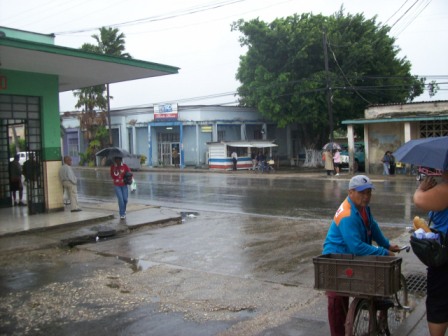
Sterilized, depersonalized, inexpressive, emotionless, difficult to describe: that’s the image of the teacher of the Ministry of Interior officials circulating lately through a video conference, mysteriously leaked and quickly spread through the networks. The figure distantly brings to mind that French movie villain of the 1960s, Fantomas, eternal antagonist of the late comedian Louis de Funes in a saga of intrigue and persecution that delighted the kids of my generation.
Sure, I liked that Fantomas, the authentic one; not this sadly blurred copy who with his coarse language, extreme poverty of vocabulary and uninhibited vulgarity, tries to present a lecture on computer technology to a group in uniform that, bored and yawning, tries to maintain expressions of serious interest amid the tacky verbal diarrhea of the “prof.” So as not to profane the memory of Fantomas, I’ve decided to call this plagiarizing imposter The Clone.
Almost all readers have seen the celebrated video, available on several sites that have identified the pathetic puppet of the day with name and surname, year of graduation, speciality and other details. Ergo, The Clone exists, is real, which, I confess, I find surprising. People with much more expertise in the details of technology than I, have already commented about the crazy string of fabrications the “specialist” spins and have offered evidence of his clear intention to demonize the alternative blogosphere, mainly through attacks on its most recognized figure, Yoani Sanchez. Nothing new. But some of the details are of interest and lead to certain inferences, if the material in the presentation is genuine. For example:
It shows that these officials-cum-disciples have not the slightest knowledge of communications technology in the information age, rather scandalous if–to judge from The Clone’s verbal dysentery–they must be prepared for “a dynamic of permanent war” where “the Internet is the battlefield.” Clearly they have already lost the war.
It shows that the government not only lies to the Cuban people with the greatest audacity, misrepresenting reality, but that they unmercifully unload on their own officials charged with State security.
It establishes–building on the experiences of the Orange Revolution and especially the Iranian Green Revolution–that the permanence of the system, the government and the Revolution are hanging by a thread: the bloggers or any young troublemaker with “uncontrolled” access to the social networks could generate a conflict. That is, the outbreak of conflicts could prove that the Olive-Green legend doesn’t depend on sociopolitical reality, but on the possibility of access to Twitter, Facebook or YouTube, which says a lot about the supposed strength of the Revolutionary process, of popular will to defend the Revolution, and the absence of real links with the country’s youth.
It recognizes that the United States government has the perverse intention of “permitting a free flow of information between Cuban citizens and the world.”
Cuban immigrants in the United States “are trying to present a new face,” so they have proposed a scholarship program for young people on the Island with the purpose of educating them in the latest information science technologies. Therefore, the Cuban government’s response was strong and highly characteristic of its wisdom: Don’t let the young people out.
Several months after the tirade, however, we are still waiting for the army of bloggers, mentally bound and uniformed by the Ministry of the Interior, to emerge victoriously on the battlefield and crush us with their technology and arguments. Apparently their standard-bearers, such as Yohandry Fontana and his feminine version, Tina Modotti–who despite having the full support of the majestic power dare not post under their own names and faces–haven’t turned out to be very convincing. They don’t really rank, the truth being that the charm of blogging lies in the purest exercise of freedom of expression.
We could carry on at length about this extraordinary display of failure, but I don’t think it’s worth the trouble. I’m sure that readers have more opinions than I mention here. I could almost be thankful for some of the touches of comedy in the video, for example when The Clone sucks up to Chavez with his ridiculous flattery (“Chavez doesn’t look like anybody,” he says with delight and admiration). Thank God! I’d like to add. I don’t believe the earth could bear the weight of another such specimen. And here The Clone allows himself an anecdote with tender detail: the Venezuelan president, Twitterer par excellence with an overwhelming half million followers on the site, responds to calls for help from his people through the social networks and assigns his subordinates the task of meeting the demands of the population.
Perhaps this explains why the little Castro brothers don’t open Twitter accounts… They would collapse in the first minutes faced with the accumulation of demands from Cubans.
February 15, 2011

 The trial for the deaths at the Psychiatric Hospital seemed like a bad theater set painted by the official press, which tried to adorn that which we all know with legal technicalities: The setback of public health, the weakness of the judicial system, and the hypocrisy of the communications media.
The trial for the deaths at the Psychiatric Hospital seemed like a bad theater set painted by the official press, which tried to adorn that which we all know with legal technicalities: The setback of public health, the weakness of the judicial system, and the hypocrisy of the communications media.








